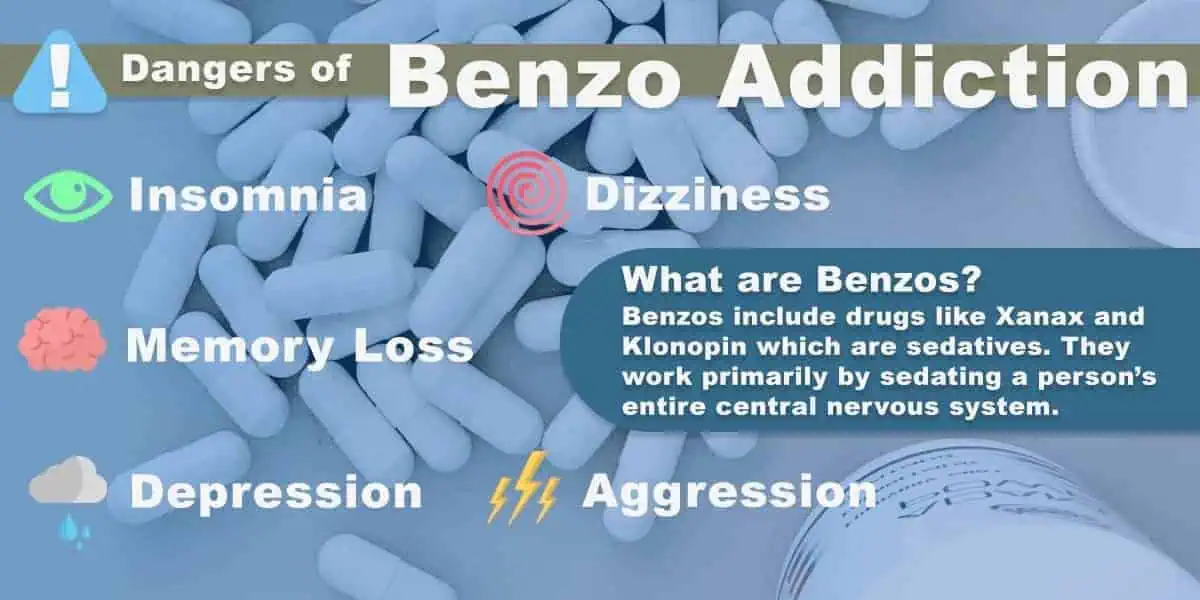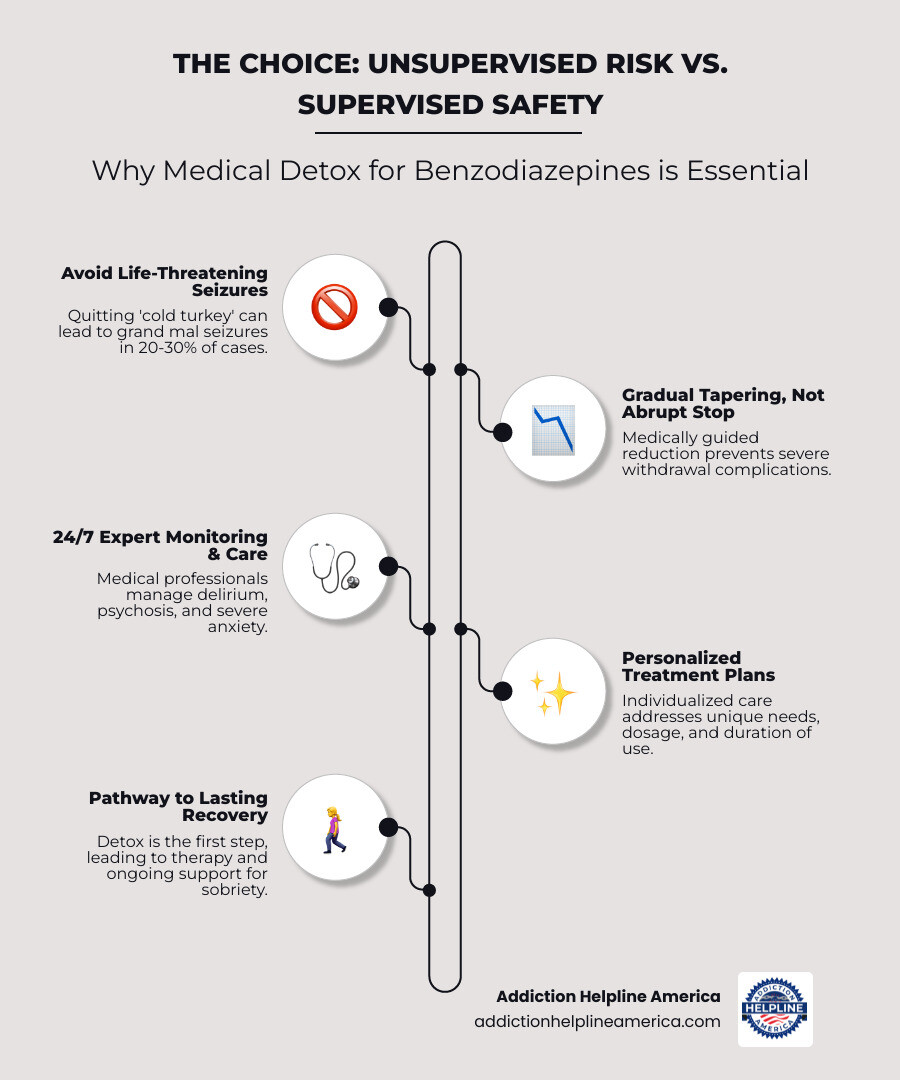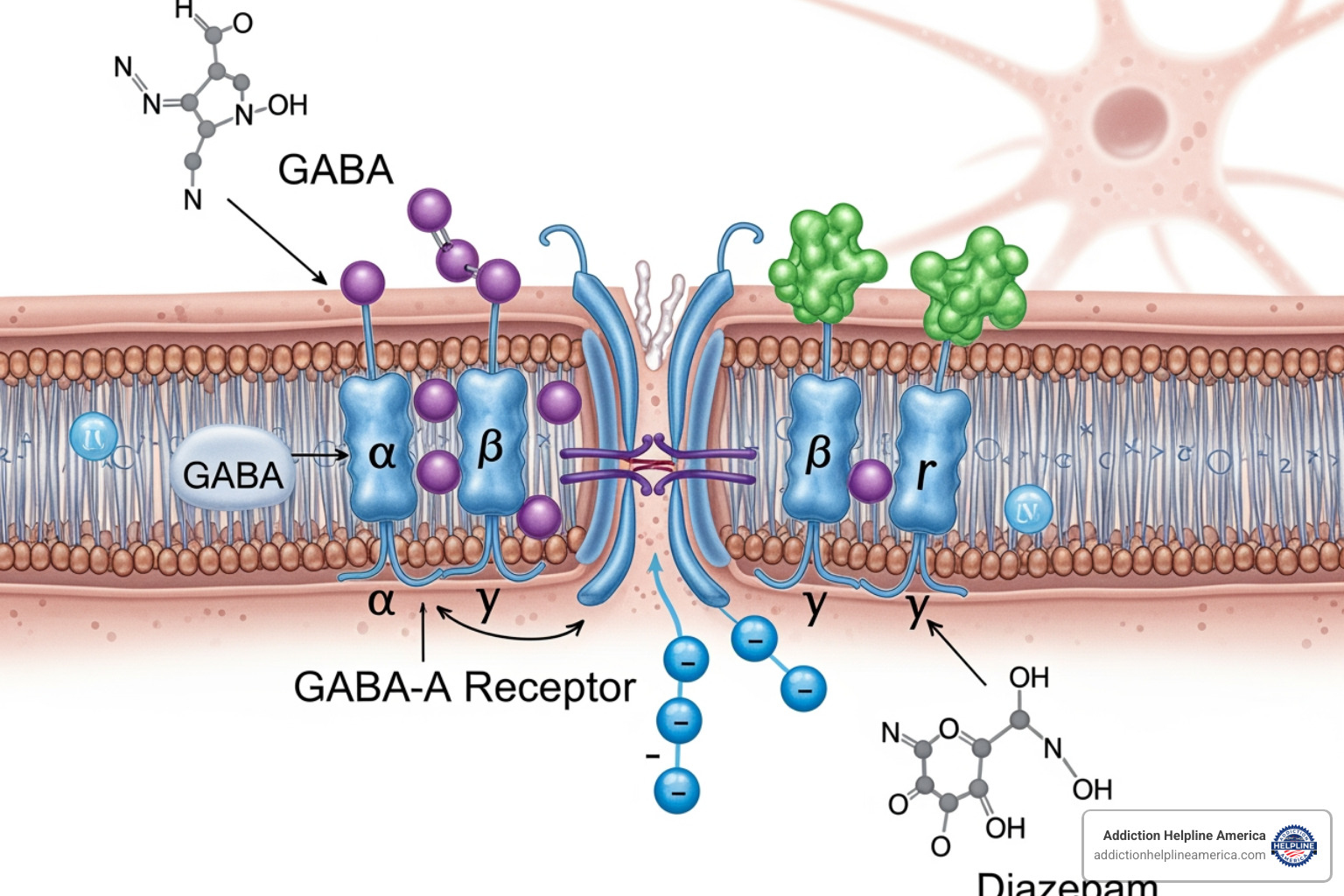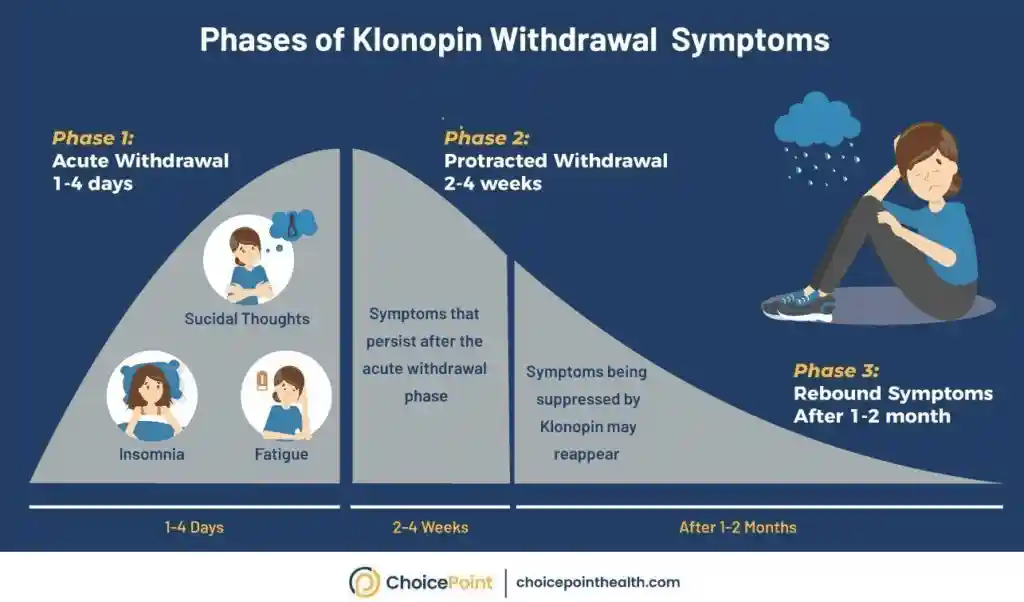
Why Safe, Medically Supervised Detox Is Essential for Benzodiazepine Withdrawal
Detox for benzodiazepines is a critical medical process requiring professional supervision due to potentially life-threatening withdrawal. Safe benzodiazepine detox involves:
- Gradual tapering of dosage over weeks to months, not abrupt cessation
- 24/7 medical monitoring to manage dangerous symptoms like seizures
- Medication management to ease withdrawal symptoms and prevent complications
- Individualized treatment plans based on dosage, duration of use, and individual health factors
- Transition to ongoing treatment including therapy and support for lasting recovery
Benzodiazepines—like Xanax, Valium, and Klonopin—are central nervous system depressants prescribed for anxiety, insomnia, and seizures. While effective short-term, they carry a high risk of dependence. In 2021, nearly 4 million people in the U.S. misused prescription benzodiazepines. Physical dependence can develop even when taken as prescribed, making it dangerous to stop.
Quitting “cold turkey” can trigger severe complications. Up to 20-30 percent of individuals in untreated withdrawal may experience a grand mal seizure. This is why medical supervision is essential, not just recommended. Withdrawal symptoms can start within hours and range from anxiety and insomnia to seizures and psychosis. For some, protracted withdrawal syndrome can cause symptoms to persist for months or years.
At Addiction Helpline America, we connect people with life-saving resources for detox for benzodiazepines and addiction treatment. Our team offers 24/7 confidential support to find the right medically supervised program for you. This guide explains why professional medical supervision is non-negotiable and what to expect during recovery.

Detox for benzodiazepines further reading:
Understanding Benzodiazepine Dependence and Its Risks

Understanding why stopping benzodiazepines is so difficult is the first step in appreciating why detox for benzodiazepines requires careful medical attention. These medications change your brain chemistry, and your brain adapts to their presence, sometimes in as little as two weeks.
What Are Benzodiazepines?
Benzodiazepines are central nervous system depressants that improve the effect of GABA, the brain’s primary calming neurotransmitter. This action slows racing thoughts, relaxes muscles, and aids sleep. Doctors prescribe them for anxiety disorders, insomnia, seizure disorders, muscle spasms, and alcohol withdrawal. Common brand names include Xanax (alprazolam), Valium (diazepam), Klonopin (clonazepam), and Ativan (lorazepam). The DEA classifies them as Schedule IV controlled substances, indicating their medical use and potential for dependence. For more details, the National Library of Medicine provides an overview of Benzodiazepines.
How Dependence Develops
Your brain adapts to the artificial boost in GABA activity by reducing its own natural production. This leads to tolerance, where the original dose becomes less effective. Patients taking 4 mg or more of Xanax daily for over three months face a significantly higher risk of dependence. When the medication’s effect wears off, the brain struggles without both the drug and its own diminished GABA supply, causing rebound anxiety and insomnia that can be worse than the original symptoms. With short-acting benzos like Xanax, this can cause interdose withdrawal between doses. Dependence can develop even with prescribed use in as little as two weeks, but misuse accelerates the process.
Call Now – Your Journey to Recovery Begins Today!

Take the first step towards a healthier life! Call now to connect with our compassionate team and start your recovery journey today. Your path to healing awaits!
Our recovery specialists are available 24/7 to provide support, and all calls are confidential and free. Reach out anytime – we’re here to help!
The Dangers of Long-Term Use and Misuse
Long-term use carries risks beyond dependence, as tolerance can render the medication ineffective over time. Key dangers include:
- Cognitive decline and memory problems, often described as a mental “fog” that impacts concentration and daily tasks.
- Increased risk of accidents like falls and car crashes due to slowed reaction time and impaired judgment.
- Emotional blunting, a flattening of feelings that makes life feel colorless and disconnected.
- Polysubstance use, especially with alcohol or opioids, is extremely dangerous. The combined respiratory depression dramatically increases overdose risk. Benzodiazepines were involved in nearly 30% of opioid overdose deaths in 2015. This prompted the FDA to issue its most serious “black box warning” in 2020, highlighting the life-threatening risks.
These realities underscore why professional guidance is essential. Detox for benzodiazepines is not a DIY process; it requires medical support to help your brain readjust safely.
The Benzodiazepine Withdrawal Syndrome

When someone stops taking benzodiazepines, their brain enters a state of overactivity known as the benzodiazepine withdrawal syndrome. This is one of the most challenging parts of detox for benzodiazepines.
Signs and Symptoms of Withdrawal
Withdrawal symptoms affect both mind and body, ranging from uncomfortable to life-threatening.
- Psychological Symptoms: Severe anxiety and panic attacks, insomnia, mood swings, irritability, intense cravings, difficulty concentrating, and memory problems.
- Physical Symptoms: Muscle spasms and pain, headaches, sweating, heart palpitations, nausea, and vomiting.
- Sensory Issues: Increased sensitivity to light, sound, and touch.
- Severe/Dangerous Symptoms: Blurred vision, seizures, hallucinations, and psychosis.
It’s important to distinguish rebound effects (a temporary, intense return of original symptoms) from withdrawal symptoms (a broader set of new or intensified reactions to the drug’s absence).
The Withdrawal Timeline: Acute vs. Protracted Phases
The withdrawal timeline varies based on the type of benzodiazepine used.
- Short-acting benzodiazepines (e.g., Xanax, Ativan): Withdrawal can begin in 6 to 8 hours, peak around day 2, and improve by day 4 or 5.
- Long-acting benzodiazepines (e.g., Valium, Klonopin): Symptoms may not appear for 24 to 48 hours or more, peaking in the second week and subsiding over 3 to 4 weeks.
The acute withdrawal phase, the most intense period, typically lasts 1 to 4 weeks. However, an estimated 10 to 25% of long-term users experience Post-Acute Withdrawal Syndrome (PAWS), where less intense symptoms linger for months or even years. About 10 percent of people who abuse benzos still feel withdrawal symptoms years after they have stopped taking the drugs. PAWS can include chronic anxiety, insomnia, and cognitive difficulties. You can find more Information on protracted withdrawal to understand this condition.
Factors Influencing Withdrawal Severity
Each person’s withdrawal experience is unique, influenced by several factors:
- Type of benzodiazepine: Short-acting benzos often cause a more intense, rapid withdrawal.
- Dosage and duration of use: Higher doses and longer use lead to more severe withdrawal.
- Individual physiology: Metabolism, age, and overall health play a significant role.
- Co-occurring mental health conditions: Underlying anxiety or depression can intensify during withdrawal.
- Polysubstance use: Using other substances, especially alcohol or opioids, complicates detox and increases risks.
Understanding these factors allows medical professionals to create a safe and effective detox for benzodiazepines plan custom to your needs.
Call Now – Your Journey to Recovery Begins Today!

Take the first step towards a healthier life! Call now to connect with our compassionate team and start your recovery journey today. Your path to healing awaits!
Our recovery specialists are available 24/7 to provide support, and all calls are confidential and free. Reach out anytime – we’re here to help!
The Critical Role of Medically Supervised Detox for Benzodiazepines

If there’s one message we want you to take away from this guide, it’s this: detox for benzodiazepines requires professional medical supervision. This isn’t about being cautious or overly careful—it’s about staying alive.
Benzodiazepine withdrawal is one of the few withdrawal syndromes that can be fatal, placing it in the same category as alcohol withdrawal. That’s why we take this so seriously at Addiction Helpline America.
Why You Should Never Detox Alone
Quitting benzodiazepines “cold turkey” is extremely dangerous. When the drug is suddenly removed, the brain can become dangerously hyperactive, leading to life-threatening complications.
- Grand mal seizures are a primary risk. A grand mal seizure may occur in perhaps as many as 20-30 percent of individuals undergoing untreated withdrawal from these substances.
- Other severe risks include delirium (profound confusion), psychosis (hallucinations and delusions), and intense psychological distress that can lead to suicidal thoughts.
- The cardiovascular system is also strained, potentially triggering heart problems.
Medically supervised detox provides 24/7 monitoring in a controlled environment, where healthcare professionals can intervene immediately if complications arise. This is the only safe way to manage withdrawal.
The Gold Standard: A Guided Benzodiazepine Taper
The safest method for detox for benzodiazepines is a gradual dose reduction, or taper. This allows your brain to slowly readjust to functioning without the medication, preventing the shock of abrupt cessation. A common strategy is switching to a long-acting benzodiazepine like Diazepam (Valium), which provides more stable blood levels and a smoother taper. This approach is recommended by resources like The Ashton Manual withdrawal strategy.
A doctor creates an individualized tapering schedule based on your specific drug, dosage, duration of use, and health. This customized approach minimizes the risk of seizures and other severe complications, making the process far more tolerable.
Medications and Comfort Measures for Benzodiazepine Detox
A comprehensive detox program uses various tools to manage symptoms and improve comfort.
- Supportive medications may be used to prevent complications and ease discomfort. Anticonvulsant medications (e.g., carbamazepine, pregabalin) help prevent seizures and reduce anxiety. Antidepressants or other non-addictive anxiety medications can manage mood disturbances, while sleep aids can address insomnia.
- Holistic and therapeutic support is also key. This includes nutritional therapy and proper hydration to help the body heal, relaxation techniques like yoga and meditation to manage stress, and psychological counseling to provide emotional support and coping strategies.
This comprehensive approach is detailed in research on Pharmacological strategies for detoxification. It creates the safest and most comfortable path through withdrawal.
Finding the Right Benzo Detox and Treatment Program

Successfully navigating detox for benzodiazepines is a powerful achievement, but it’s truly just the beginning of your recovery journey. Finding the right treatment program can feel overwhelming, which is why Addiction Helpline America is here to help connect you with quality care that fits your unique situation.
Types of Detox Programs
Different levels of care exist to meet varying needs, depending on the severity of dependence, home environment, and overall health.
- Inpatient or residential detox offers the highest level of care with 24/7 medical supervision in a facility. It is essential for those with high-dose dependence, polysubstance use, co-occurring health conditions, or an unstable home environment. Detox typically lasts 5 to 14 days.
- Outpatient detox allows you to live at home while attending regular appointments at a clinic for monitoring and medication management. This option is suitable for individuals with milder dependence and a strong, stable support system.
- Partial Hospitalization (PHP) and Intensive Outpatient (IOP) programs are intermediate options. PHP involves several hours of treatment daily, while IOP is less intensive, with treatment a few days per week. They provide medical oversight while allowing you to maintain some daily responsibilities.
Here’s a quick comparison to help you understand the key differences:
| Feature | Inpatient/Residential Detox | Outpatient Detox |
|---|---|---|
| Setting | 24/7 medical supervision in a dedicated facility | Regular clinic visits while living at home |
| Intensity | Highest level of care with constant monitoring and immediate intervention | Lower level of care requiring strong home support |
| Duration | Typically 5-14 days depending on individual response | Several weeks to months with slower tapering |
| Best For | High-dose or long-term users; polysubstance use; co-occurring conditions; unstable home environment | Low-dose users with strong support systems and stable living situations |
| Safety | Lower risk due to constant medical oversight | Higher risk if complications arise between visits |
What to Look for in a Quality Detox Center
When choosing a facility for detox for benzodiazepines, look for these key features:
- Licensing and Accreditation: Ensures the center meets established standards for safety and quality of care.
- Experienced Medical Staff: The team must have specific expertise in benzodiazepine withdrawal and tapering protocols.
- Individualized Treatment Planning: A quality center creates a personalized plan based on a thorough assessment of your unique situation.
- Evidence-Based Therapies: The program should integrate therapies like Cognitive Behavioral Therapy (CBT) and Dialectical Behavior Therapy (DBT).
- A Full Continuum of Care: The best centers provide a seamless transition from detox to ongoing care, such as residential rehab or outpatient programs.
Life After Detox: Continuing Care for Lasting Recovery
Detox is not a cure for addiction; it stabilizes you so the real work can begin. Lasting recovery involves:
- Residential Rehabilitation: An immersive program (30-90+ days) focused on therapy and building coping skills in a trigger-free environment.
- Behavioral Therapies: CBT and DBT are cornerstones of treatment, helping you change thought patterns and manage emotions without medication.
- Support Groups: Peer groups like Narcotics Anonymous or benzodiazepine-specific groups provide invaluable connection and accountability.
- Dual Diagnosis Treatment: Essential for addressing co-occurring mental health conditions like anxiety or depression, which often underlie benzodiazepine dependence.
Call Now – Your Journey to Recovery Begins Today!

Take the first step towards a healthier life! Call now to connect with our compassionate team and start your recovery journey today. Your path to healing awaits!
Our recovery specialists are available 24/7 to provide support, and all calls are confidential and free. Reach out anytime – we’re here to help!
Paying for Benzodiazepine Detox and Treatment
Cost should not be a barrier to life-saving treatment. Help is more accessible than you may think.
- Health Insurance: Most plans cover addiction treatment. Our team at Addiction Helpline America offers free, confidential health insurance verification. We work with PPO, POS, EPO, and HMO plans to clarify your benefits and find in-network facilities.
- Other Options: If you lack insurance, private pay options, financing plans, and state-funded programs are available. We can help you explore every avenue.
Don’t let financial worries stop you from making the call. We can help you find a solution. You can learn more about your options in our Professional Addiction Help Complete Guide.
We also encourage you to explore resources about related detox programs, including drug detox treatment centers, alcohol detox treatment centers, and if you’re in Georgia, detox treatment centers in Georgia.
Conclusion
Taking the time to learn about detox for benzodiazepines is a courageous first step. The path to recovery can feel daunting, but it’s important to remember: recovery is absolutely possible, and you don’t have to do it alone.
This guide has highlighted the serious, life-threatening risks of stopping benzodiazepines on your own. Quitting “cold turkey” can trigger seizures in 20-30% of cases, along with other medical emergencies. This is why medically supervised detox for benzodiazepines is the only safe option. A gradual, physician-managed taper allows your brain to heal safely, while supportive care makes the process manageable.
However, detox is your beginning, not your finish line. Lasting recovery is built through ongoing treatment, including residential programs, evidence-based therapies like CBT, and peer support. This is how you develop new coping skills and address the root causes of dependence.
At Addiction Helpline America, we connect people with quality, accredited treatment centers in every state. We offer free, confidential consultations to help you find the right program for your unique needs. Our team can verify your insurance benefits or explore other payment options to remove financial barriers.
You’ve already shown strength by seeking information. Let us help you take the next step.
Contact us for free, confidential help finding a treatment center
Our helpline is 100%
free & confidential
If you or someone you care about is struggling with drug or alcohol addiction, we can help you explore your recovery options. Don’t face this challenge alone—seek support from us.
Programs
Resources
Will my insurance
cover addiction
treatment?
We're ready to help
Find the best
drug or alcohol treatment
center
Are you or a loved one struggling with addiction? Call today to speak to a treatment expert.















